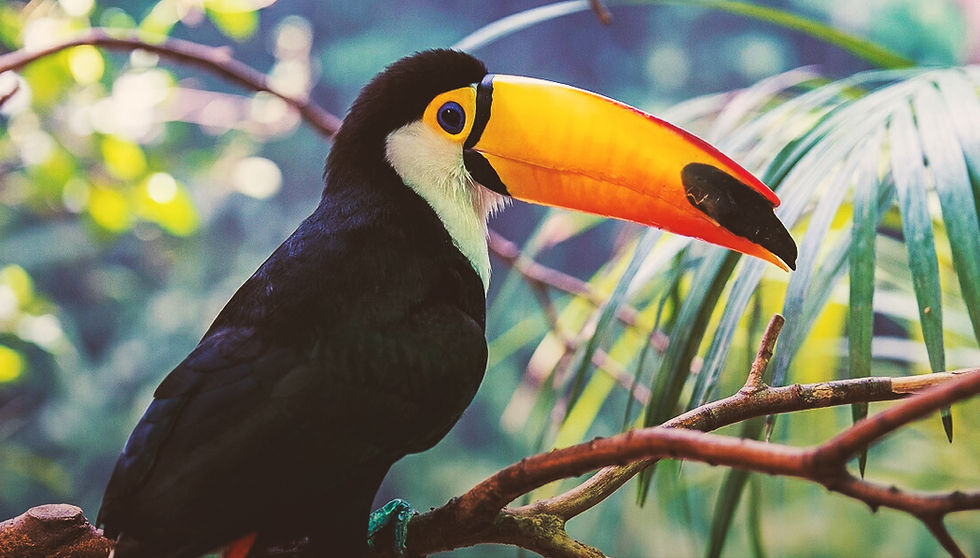
You do not have to be a zoologist to find the very existence of some animals just makes you happy.
I feel that way particularly about butterflies and birds. Not all birds, or at least, not all birds in equal measure, though. Some avians have a certain something that lifts them from the realm of “nice” to the kind of awesome that just makes your day brighter as soon as you think of them.
In some cases, it is about beauty, but, often as not, it has more to do with laughable absurdity than anything. (Of course, I am just speaking here about plain old point-and-stare absurdity, not a lack of adaptation to their environment or ridiculousness from a zoological perspective.).
The idea of compiling a list of the world’s brightest, most joy-inspiring, flamboyant and generally entertaining birds started as a joke with a friend, but, little-by-little, our list expanded. A couple of new species have been discovered since the list was started and I have stumbled upon a whole load of day-brightening birds I previously knew nothing about as the list has grown.
The question really boils down to “If you had to list the most freakish, garish or just plain awesome birds in the world, what would they be?”
As you might expect, the list of feathered freakery is by now rather long (if not distinguished). Part One of the list is on this blog [HERE], while the next 5 entries (list numbers 6-10) follow in “Part Two” below-

6. Toucan.
You can tell a lot about a bird from the shape of his/her beak....birds that probe for their prey often have long, thin, pencil-like beaks for poking at the soil or mud and extracting their prey from the ground, or foliage or whatever substrate they are hiding within; woodpeckers have robust, pointed, chisel-like beaks for their long days of chiselling at tree trunks; nectivores like sunbirds and hummingbirds have elongate, curved beaks to reach deep into their choice of flower....and the toucan, well, the toucan has a beak (bill) like this.
https://en.wikipedia.org/wiki/File:Selenidera_maculirostris_-Brazil_-male-8.jpg
or like this-
https://en.wikipedia.org/wiki/File:Lettered_Ara%C3%A7ari.jpg
or like this-
https://en.wikipedia.org/wiki/Toco_toucan
depending on the species.
Since it looks superficially like a kingfisher's beak and since it has forward-facing serrations, it was once thought that the toucan's impressive bill was so shaped to facilitate catching fish. Today, most toucans are known to eat primarily fruit, like parrots do, so, clearly, their impressive (you might say monstrous) bill is not a prerequisite for their diet. It has been proposed more recently that the distinctive bill plays a role in toucan temperature regulation ( see: "Heat Exchange from the Toucan Bill Reveals a Controllable Vascular Thermal Radiator", by G. J. Tattersall, D. V. Andrade and A. S. Abe, Published in the journal Science. Volume 325 (Issue 5939): pages 468–470 in 2009.
( doi:10.1126/science.1175553. PMID 19628866.). Whatever the full story, there is something really day-brightening about the sheer absurdity of a toucan, whether that means a familiar "Toco Toucan"-

Or a smaller, more obscure species, like a Lettered Aracari-

..or another species entirely: enjoy.
7. Next on the list is The Black Heron, Egretta ardesiaca.
Admittedly, its colours are rather more sombre than those of the toucan, but it's habit of canopy feeding (providing shade for fish, which it then eats) is freakish enough for it to make the list.
Here's a picture by Neil Strickland taken in Madagascar-

8. At Number 8, we have the King Vulture, Sarcoramphus papa.
Hideous, fabulous or just plain strange? What do you think?-
https://www.nationalgeographic.com/content/dam/photography/photos/000/564/56405.ngsversion.1467253214845.adapt.676.1.jpg
http://keywordsuggest.org/gallery/18909.html
https://www.flickr.com/photos/8749778@N06/2867793585
[Possibly this is the King Vulture version of "Blue Steel" from "Zoolander"...
https://upload.wikimedia.org/wikipedia/commons/thumb/a/a2/King_Vulture_001.jpg/250px-King_Vulture_001.jpg ]
9. Next on the list, the Philippine eagle (Pithecophaga jefferyi) is a beautifully weird creature from the forests of the Philippines. Considered *the world's largest eagle* in terms of length and wing surface, it is sadly critically engandered. (*Note*: *Steller's Sea Eagle , Haliaeetus pelagicus and the *American Harpy Eagle, Harpia harpyja are larger in other regards).
Check it out here-
https://upload.wikimedia.org/wikipedia/commons/5/5a/Pithecophaga_jefferyi_front.jpg
here-
http://3.bp.blogspot.com/-Ajw11kDsGuE/UGBnmb-srQI/AAAAAAAAINk/uYPCV5yOO6c/s1600/philippine_eagle-1680x1050.jpg
and here-
http://letsdraw.factualfiction.com/2012/09/philippine-eagle_23.html
10. Finally, Lilian's Lovebirds, Agapornis lilianae , are not spectacular nor dramatically freaky, they are just...well...rather lovely: beautiful, endearing cheering-up birds to warm the hardest heart.
Johan Vermuelen has some gorgeous photographs of them online here-
http://www.skekek.com/lilians-lovebirds
If paintings are more your style, this picture by John Gerrard Keulemans was published in the journal The Ibis in 1894 -

-Article by V. Neblik for The Greatest Minds
Part 3 of The "Cheering Up Birds" series will be posted on this blog in due course.
For Part 1, click [HERE].

The Lettered Aracari's beautiful. You should do put hummingbirds in your cheering up birds - the ones we get in San Diego definitely cheer up my day. Anna's Hummingbird is my favorite- so metallic and shiny.